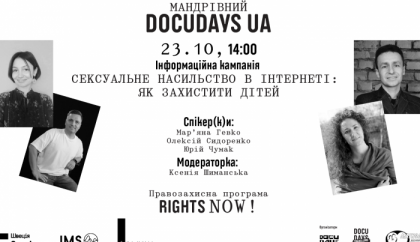
Unwanted conversations on sexual topics, strangers sending porn or photos of their own genitals, interest in the child's intimate parts, offers to show or touch themselves naked on camera or take off their underwear, and possibly the distribution of these materials, blackmail or meetings in real life — it may seem to many parents that all this is very distant and ‘definitely not happening to our child’.
Meanwhile, according to statistics from international organisations, 1 in 8 children in the world has suffered from sexual abuse or harassment on the Internet*. It takes an average of 19 seconds for criminals to establish a trusting relationship with a child online, and within 45 minutes they can receive intimate photos or videos from a child**. In 2022, Ukraine ranked 5th in terms of hosting child sexual abuse materials.*** Almost a quarter of Ukrainian children surveyed have been involved in at least one situation of sexual abuse or exploitation on the Internet, and half have not told anyone about it. At the same time, most children did not receive any warning or explanatory information about the relevant threats — these are the findings of national studies.
In June 2024, Docudays NGO and Magnolia NGO launched the information campaign 'Sexual Violence on the Internet: How to Protect Children'. Currently, the team of the Travelling International Human Rights Documentary Film Festival Docudays UA, which has been visiting cities and villages of Ukraine since October, together with the Human Rights Department of the Docudays NGO, are preparing a joint event for all regions dedicated to this topic. It will take place on 22 and 23 October in an online format, so it will be available in almost all parts of the country.

Screenshot from The Caught in the Net
We will screen the documentary Caught in the Net by the Czech filmmakers Barbora Chalupová and Vít Klusák. In the film, three adult actresses pretend to be twelve-year-old girls, ‘live’ in specially created copies of their childhood rooms, and correspond and meet with strangers via video link while being recorded by cameras. This fascinating experiment introduces us to one of the biggest threats to children in the digital world today and shows us what online communication platforms can become in the hands of some adults.
After the screening, we invite you to discuss the film with experts and learn how to recognise the signs of online child sexual abuse, who to turn to for help, who is responsible for combating these crimes, and how to keep children safe.
Speakers of the event:
- Maryana Hevko, a psychologist at the Barnahus Centre in Ternopil Region, a trainer, an expert at the International NGO ‘International Centre for Development and Leadership’ and a project manager at the DOCU/CLUB Network;
- Oleksiy Sydorenko, Head of the Department for Combating Violence Against Children at the All-Ukrainian Magnolia NGO;
- Yuriy Chumak, human rights activist, regional coordinator of the Travelling Docudays UA Festival in Kharkiv and Cherkasy regions.
Moderator of the conversation: Kseniya Shymanska, human rights activist, director of the Human Rights Department at the Docudays NGO.
Time and place of the meeting: 23 October, 14:00, ZOOM.
You can take part in the online event of the information campaign ‘Sexual abuse on the Internet: how to protect children’ by filling in a short registration form.
The links to the documentary screening and the conference will be sent to all registered participants a few days before the event.
*WeProtect Global Alliance report (2023)
**Research by the Childlight Global Child Safety Institute at the University of Edinburgh (2024)
***Data from the International Association INHOPE (2022)
21st Travelling Docudays UA is supported by the Embassy of Sweden in Ukraine, the Embassy of the Kingdom of the Netherlands in Ukraine and International Media Support.
The opinions, conclusions or recommendations do not necessarily reflect the views of the governments or charitable organisations of these countries. The content of this publication is the sole responsibility of its authors.
All news



